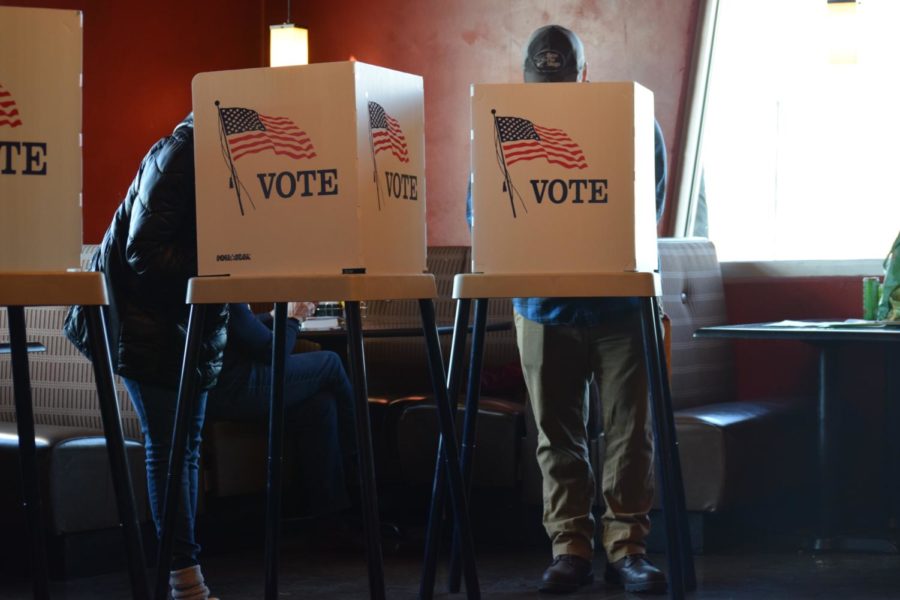‘If you don’t vote, you don’t count’: Early voting begins
Photo by Katherine Kealey/Iowa State Daily
Students can visit the Story County website to receive information about registering to vote, sending in absentee ballots and the election in general.
Satellite absentee voting for all of Story County begins in Ames Friday at the Memorial Union’s Cardinal Room from 9 a.m. to 4 p.m. Unregistered voters can register to vote on-site.
At the polls, voters are required to show a valid form of identification and proof of residence. Valid forms of identification include, but are not limited to, Iowa State University IDs with an expiration date, driver’s licenses from both in or out of state, tribal and military IDs, as well as passports.
“If your driver’s license has your current address in Ames on it, that can function as both your ID and your proof of residence,” said Karen Kedrowski, director of the Carrie Chapman Catt Center. “If you don’t have that, a tax receipt like a property tax receipt, bank statement [or] pay stub from your employer [will suffice].”
Only in Story County can Iowa State students also use the information provided under the Voter Reg Address on Access Plus as proof of residence. Students who commute from out of the county can not use Iowa State IDs or Access Plus as valid forms of identification at their polling locations.
“So a student very easily can use their Iowa State student ID and their device to show on the Access Plus the current student information,” Kedrowski said.
Per legislation signed in 2021 by Gov. Kim Reynolds, which imposed restrictions on satellite and absentee voting, county auditors can only schedule four days of satellite voting. The remaining dates and locations for satellite voting are:
- Oct. 29 at the Ames Public Library’s Farewell T. Brown Auditorium
- Oct. 31 in room 004 of the Scheman Building
- Nov. 5 at the Ames Public Library’s Farewell T. Brown Auditorium
All polling locations are operable between 9 a.m. to 4 p.m. Voters also can no longer return absentee ballots at in-person voting locations; they must be returned to their designated county auditor’s office by the time the office closes — for both mailed-in and dropped-off ballots.
Absentee ballots must be returned by the voter, a member of their family, a caregiver or a member of their household.
“That prohibits, for example, activist organizations or your fraternity brother — or just a good friend being willing to do a favor for another friend — from returning an absentee ballot,” Kedrowski said.
Mack Shelley, a university professor in political science, said he believes the bill was passed to stop certain people from voting. Kedrowski said she believes the legislation, which only received votes of favor from Republicans, was the result of unsubstantiated claims of voter fraud during the 2020 election.
Shelley said the unsubstantiated claims surrounding the 2020 election could “otherwise [be] known as lies.”
Kedrowski said any legislation that restricts voting opportunities tends to disproportionately impact vulnerable groups.
“So those that do not have a lot of flexibility in their workday, people who have transportation issues, childcare or elder care responsibilities, folks that live out of state — all of those are our populations that could be adversely affected by these changes,” Kedrowski said.
Federal election security officials described the 2020 election as “the most secure in American history.” One of the many claims of voter fraud was that non-citizens were voting, which Shelley said happens once in a blue moon.
Kedrowski said most of the claims of voter fraud were not in Iowa.
“So for example, there were charges that people who were counting votes in Maricopa County, Arizona — which is where Phoenix is — were investigated, and there were two recounts, and the results were the same,” Kedrowski said.
Kedrowski also shared an example which alleged poll workers in Georgia of passing flash drives back and forth, which, when investigated, turned out to be an exchange of cough drops.
“So what will happen is that the story [of voting fraud] will propagate — and it might actually be based on something factually true — but it gets blown out of proportion,” Shelley said.
Shelley implores people to be more civically engaged, highlighting younger Americans’ disproportionate turnout rate.
“If you don’t vote, you don’t count,” Shelley said.
Your donation will support the student journalists of the Iowa State Daily. Your contribution will allow us to purchase equipment, send our student journalists to conferences and off-set their cost of living so they can continue to do best-in-the-nation work at the Iowa State Daily.











